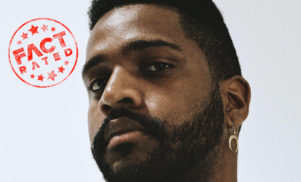FACT Rated is our series digging into the sounds and stories of the most vital breaking artists around right now. This week, Claire Lobenfeld talks to Martyn Bootyspoon, whose Fractal Fantasy debut Silk Eternity, released earlier this month, is informed by an undying love for the fun and humor of ghettotech and bootyhouse.
IN SHORT
NAME: Martyn Bootyspoon
FROM: Montréal
MUST-HEAR: Silk Eternity (Fractal Fantasy, 2018)
FOR FANS OF: DJ Assault, Sinjin Hawke, ’90s US dance-club
Jason Voltaire, aka Martyn Bootyspoon, discovered his love for electronic music early: hearing Homework-era Daft Punk on the Canadian video channel Much Music while getting ready to go to kindergarten. Now, at 27, the Montréal-based ghettohouse-revivalist has released his first EP, Silk Eternity, a five-track compendium that Voltaire describes as a mediation between small club sets and stadium-size festival crowds. The EP, which was released earlier this month on Fractal Fantasy — co-label boss Sinjin Hawke and Voltaire have been friends for nearly a decade — combines bootyhouse and ghettotech for the 2010s. His reverence for those genres has much to do with a truly homegrown education in dance music, both in the actual house he grew up in and the Montréal club scene where he cut his teeth.
A young Voltaire was made acquainted with a range of music through his family. His father had played guitar in a band in Haiti and had a robust record collection that included other Haitian music, as well as Motown, George Benson and Marvin Gaye, among others. “He would rinse a lot of Rick James and shit,” Voltaire says. His older brother’s own interest in dance music, DJing and production gave Voltaire exposure to people like Ricardo Villalobos and Luke Slater and, later, more molecular dance movements.
“My brother’s crates were starting to get more minimal techno oriented. [Alexander Robotnick’s] ‘Dance Boy Dance’ was a record he showed me when I was 11,” he says. “He was doing the whole retrospective for me before I could even get into house music.” He began learning to work with Reason and FL Studio. “Around the same time, DJ Assault was making the rounds on the internet,” Voltaire adds. “I was a huge kid of the internet, so stuff like that would not get past me. Hearing something like DJ Assault’s ‘Ass N Titties’? That’s just gonna stick with you.”
You can hear its influence all over Silk Eternity, especially on torid, campy tracks like opener ‘Spread That Kat’, as well as ‘The Grid’, which turns sharing your browser history into something more flirtatious. The interplay between bootyhouse and ghettotech forms with updated reference points – namely, the internet – is what makes Martyn Bootyspoon’s music so compelling. He works with admiration for his forebears who he quite literally might not be here without: Sinjin and Voltaire first met on a boat party that was headlined by both DJ Funk and DJ Assault. “Sinjin and I bonded purely over their interest in bootyhouse and ghettotech. From then on, I’d just attend his club parties and an older group of friends’ house parties,” Volatire says. “I went from being a listener to thrown into Montréal’s club scene almost solely through that relationship.”
Their friendship is also what spawned the Bootyspoon character. “The name was created in a period of Sinjin and I recalling upon an era of Bad Boy Entertainment interludes,” he says. “People have John Waters for queer camp humor, but shit that was DJ Assault and Puff Daddy for us.” He cites the dramatics of Puffy’s ‘Been Around the World’ video from 1997, as well as early Neptunes skits and David Banner productions, particularly ‘The Whisper Song’, as some of the cornerstones of the persona. “I think Bootyspoon was a name I just literally pulled out of my ass and made up, but it ended up becoming a drunk alter ego-slash-sassy party friend,” he says. “It’s the fallout of club rap from the early 2000s.”
Although a sense of humor and playfulness are deeply embedded in Voltaire’s music – ’90s dance-club powerhouse ‘Rhythm of the Night’ is sampled on track ‘Ease U’ – his deference for dance music is also undeniable. “The EP is definitely reaching for the ethos and essence of a house record being unconventional production techniques and working with as little means as possible,” he says. “I can’t afford to go on eBay and get a vintage 808 or 909. I made this EP on a Sony Vaio with missing keys and a synth on [my] phone. I consider most rap producers as today’s ghettohouse producers more so than a dude with a really expensive studio.”
Claire Lobenfeld is FACT’s news editor.
Read next: Marie Davidson’s politically-charged techno has a unique Québecois twist





























